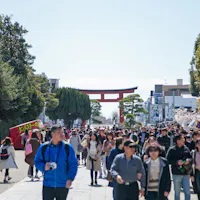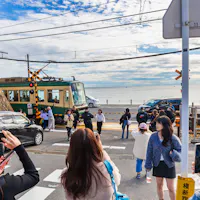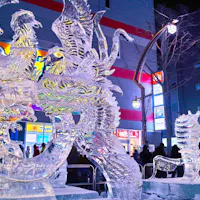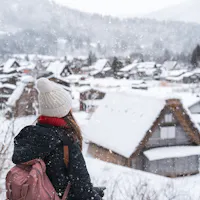10 Hidden Gems You Must Visit in Ameyoko Shopping Street
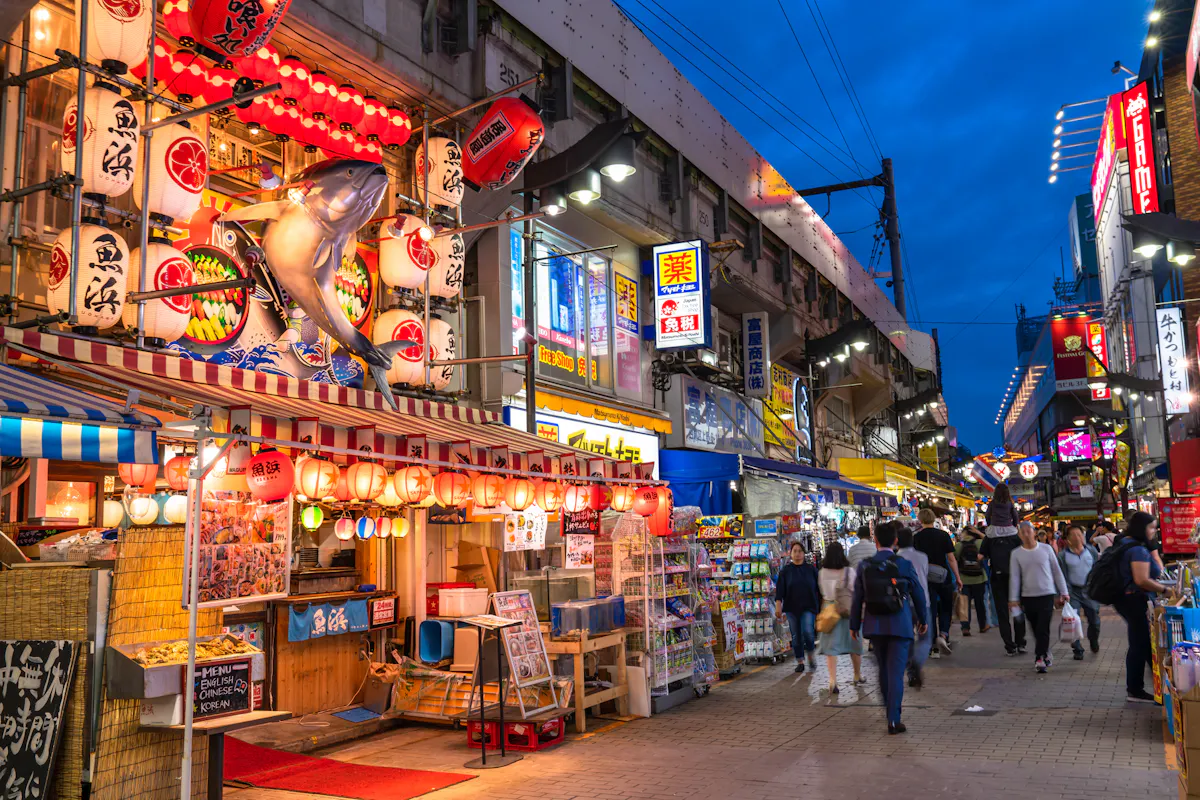
Ameyoko Shopping Street sits squeezed between the elevated train tracks near Ueno Station in Tokyo, and most tourists rush through it without noticing its best spots. This bustling market street stretches for about 500 meters, but the real treasures hide in the narrow side alleys and tucked-away corners where locals actually shop.
I've walked this street dozens of times, and each visit reveals something new. Let me show you the places that make Ameyoko Shopping Street more than just another tourist market.
1. Niku no Oyama: The Legendary Wagyu Butcher Shop
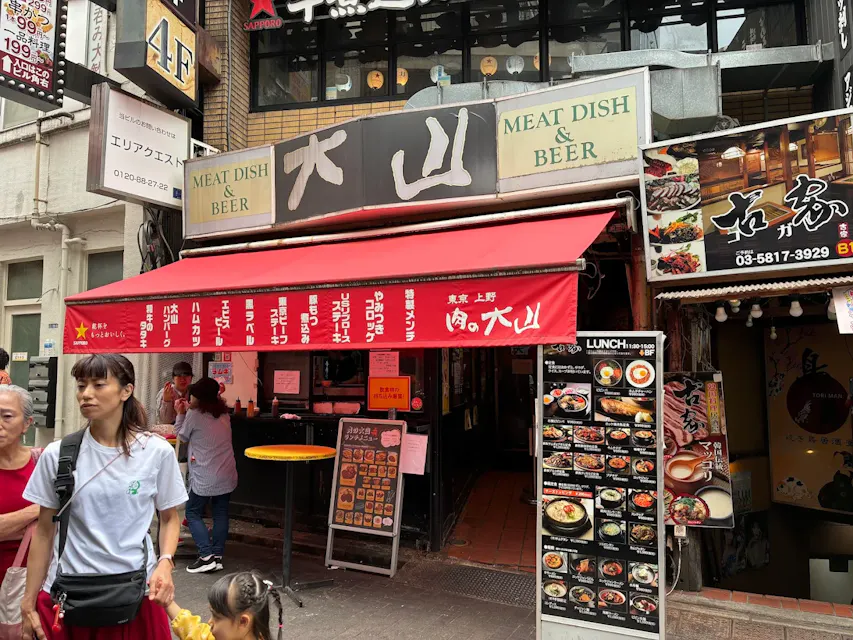
Walk past the first few souvenir shops and look for the small butcher counter with locals forming a line. Niku no Oyama has been selling premium wagyu beef at shockingly reasonable prices since the 1950s. The owner hand-selects cuts each morning from the market, and by afternoon, the best pieces are gone.
What makes this place special is their prepared wagyu croquettes. For about 300 yen, you get a palm-sized croquette that's crispy outside and melts inside. The shop doesn't advertise in English, and the storefront looks almost rundown, which is exactly why it stays authentic. Locals come here before dinner parties to buy affordable premium cuts that would cost three times as much in department stores.
2. Osho: The Standing Bar Where Everyone Knows Your Face
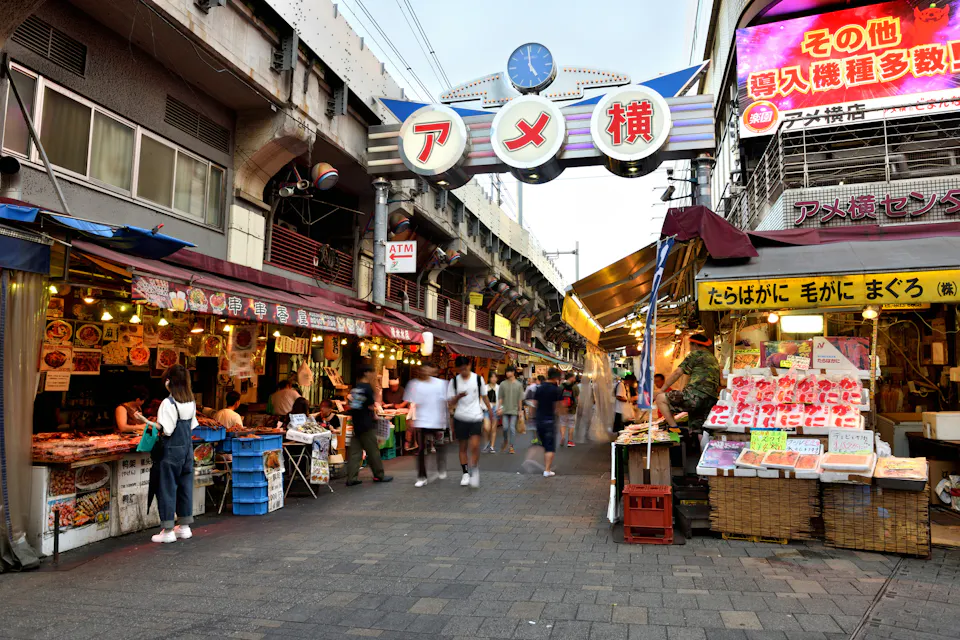
Hidden on the second floor of a narrow building in the middle section of Ameyoko Shopping Street, Osho is a standing bar that feels like stepping into 1970s Tokyo. The wooden counter wraps around the small space, fitting maybe fifteen people shoulder to shoulder.
The master behind the bar has been pouring drinks for over thirty years. He remembers faces, and after your second visit, he'll start preparing your usual order before you ask.
The yakitori here isn't fancy, but it's grilled fresh and costs about 100-150 yen per stick. This place fills up with salarymen every evening around 6 PM, and the conversations get louder and more honest as the night goes on. You won't find this spot on Instagram because phones feel out of place here.
3. Tashiro Shouten: The Dried Seafood Specialist
Most people walk right past Tashiro Shouten because it looks like a standard dried goods shop. But step inside and you'll find one of the best selections of premium dried seafood in Tokyo. The shop has been operating since 1946, and the current owner learned the trade from his grandfather.
The real treasure here is their selection of dried scallops from Hokkaido. These aren't the small, cheap ones you see everywhere. The owner sources large, hand-selected scallops that professional chefs use for making high-end dashi stock.
He'll explain exactly how to prepare them, and if you're lucky, he'll let you taste a small piece. The umami hits immediately. Japanese home cooks come here specifically for ingredients they can't find anywhere else in Ameyoko Shopping Street.
4. Niku no Ohyama Side Alley: The Spice Merchants' Corner
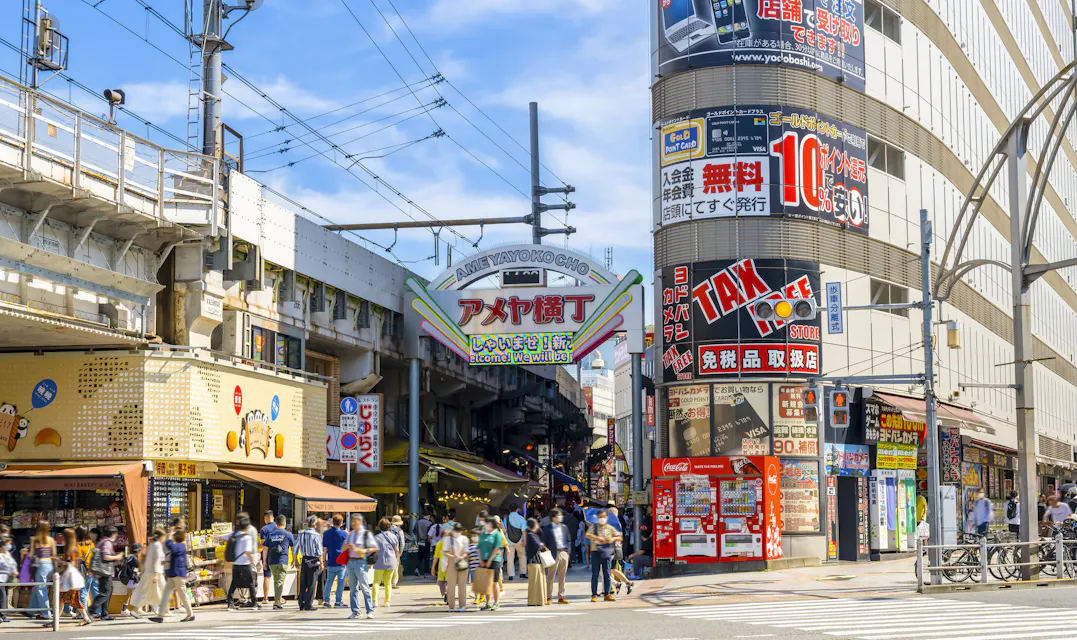
Just past the main Niku no Ohyama shop, turn into the narrow alley on your right. This cramped passage holds three tiny shops specializing in international spices. The middle shop, run by an older woman who speaks little English but communicates perfectly through gestures, stocks spices from Southeast Asia and India that Japanese grocery stores don't carry.
Her turmeric comes directly from farms in Kerala, and the cardamom pods are so fresh they still smell green. She measures everything by hand and packages it in simple plastic bags with handwritten labels. Chefs from Indian and Thai restaurants in Tokyo come here to buy bulk spices at wholesale prices. The alley itself barely fits two people side by side, which is probably why most tourists miss it completely.
5. Sato Saketen: The Natural Wine Cave
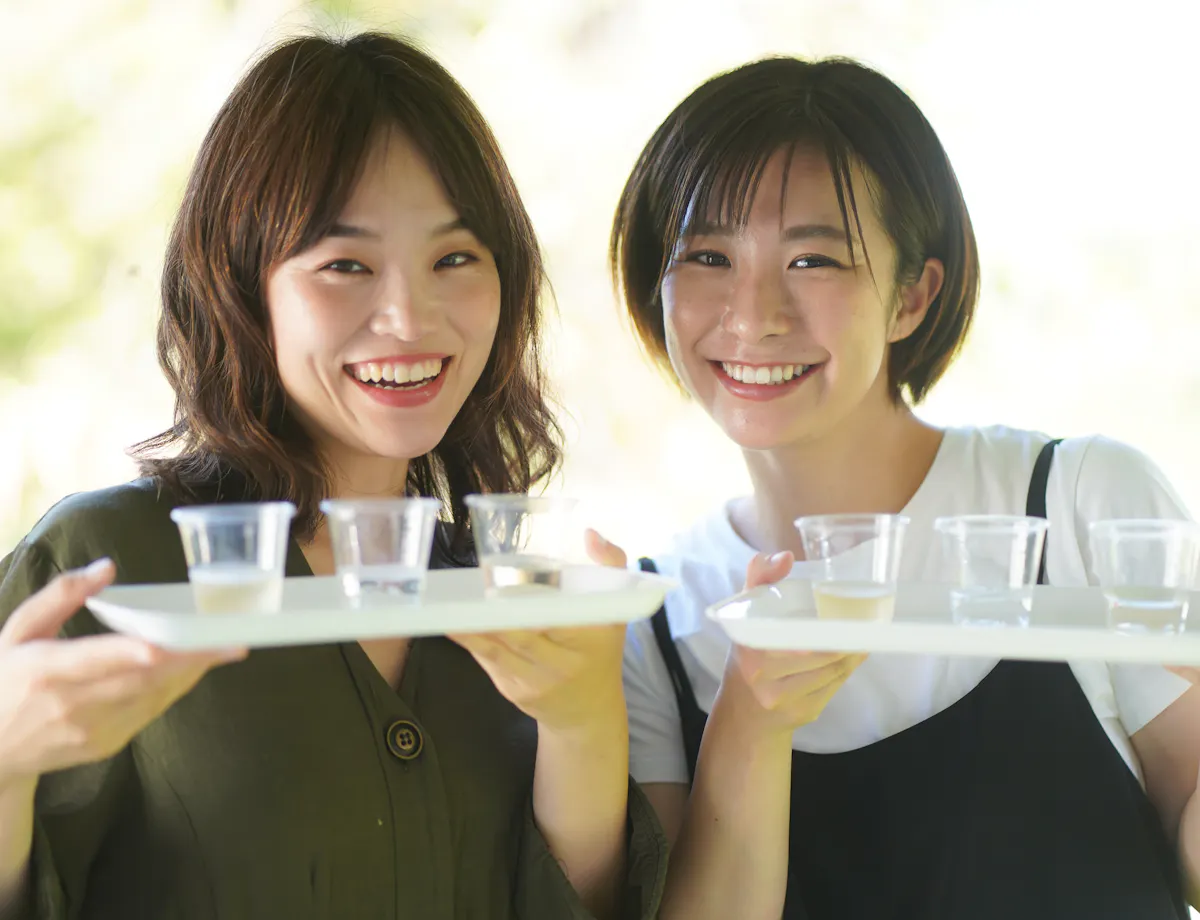
Join our sake tasting session to discover new styles and sample food pairings with a sake sommelier.
Tucked in a basement below street level, Sato Saketen looks like a regular sake shop from the entrance. But walk down the stairs and you'll discover a carefully curated collection of natural wines from small Japanese vineyards. The owner studied winemaking in Yamanashi and spent years building relationships with small producers.
He stocks bottles you won't find in department stores, focusing on organic and biodynamic wines from Hokkaido, Nagano, and Yamanashi. Each bottle comes with a handwritten note explaining the vineyard and winemaking process.
The prices run lower than wine shops in trendy neighborhoods because rent in Ameyoko Shopping Street basement spaces stays reasonable. The owner opens bottles for tasting on Saturday afternoons, turning the small space into an impromptu wine bar.
6. Miyamoto Mokkou: The Traditional Wooden Tool Workshop
Sandwiched between modern clothing shops, Miyamoto Mokkou maintains a workshop where craftsmen still make wooden kitchen tools by hand. The shop front displays rice paddles, cutting boards, and chopsticks, but the real work happens in the back room, where you can sometimes watch artisans shaping wood with hand planes.
Their cypress cutting boards develop a natural antibacterial coating over time and can last decades with proper care. The owner will explain the grain patterns and how different woods serve different purposes in the kitchen.
Professional sushi chefs replace their cutting boards here, and serious home cooks make the trip to Ameyoko Shopping Street specifically for these tools. The prices reflect the handwork, but these items will outlive anything from a regular kitchenware store.
7. Jikaseimen Yoshimaru: The Hidden Ramen Supply Shop
Walk toward the Okachimachi end of Ameyoko Shopping Street and look for the shop with bags of flour stacked in the window. Jikaseimen Yoshimaru supplies fresh noodles to ramen shops across Tokyo, and they sell directly to customers at wholesale prices.
You can buy fresh ramen noodles made that morning, and they'll tell you exactly how many seconds to boil them for perfect texture. The shop also sells concentrated soup bases that ramen restaurants use, letting you recreate authentic ramen at home.
The owner understands that most customers aren't professional chefs, so he breaks down the technical details into simple instructions. This tiny shop feeds half the ramen restaurants in Ueno, but barely anyone outside the food industry knows it exists.
8. Daimasu: The Fishing Tackle Specialist with Local Knowledge
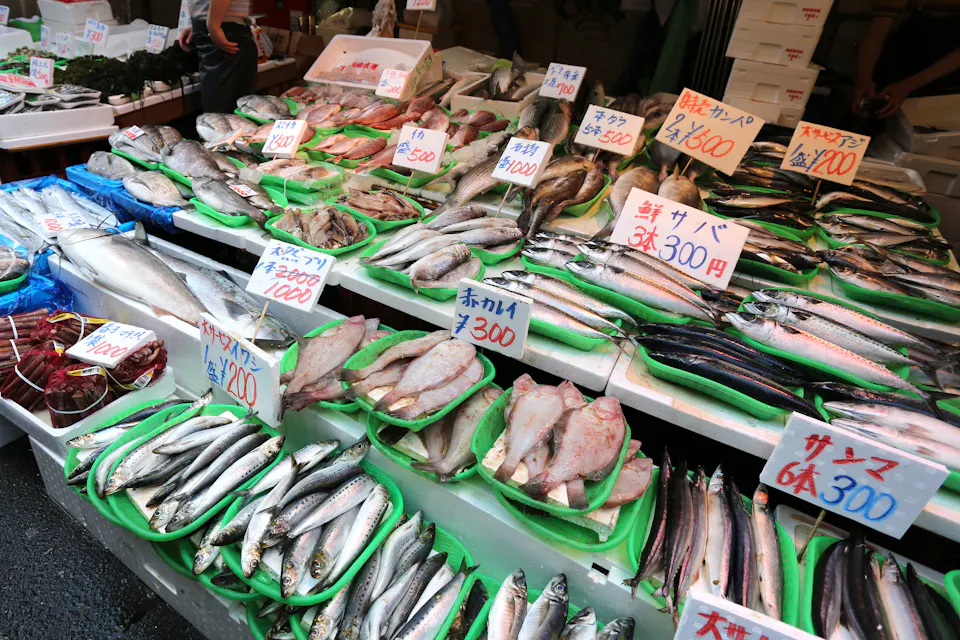
Daimasu sits near the center of Ameyoko Shopping Street and looks like a standard fishing tackle shop. What makes it special is the owner's encyclopedic knowledge of Tokyo Bay fishing spots. He doesn't just sell gear; he provides detailed information about which fish are biting where, what bait works best, and how the tides affect different locations.
Local fishermen stop by before weekend trips to get updated information and pick up specialized tackle. The shop stocks lures and rigs designed specifically for Tokyo Bay species that you can't find in regular sporting goods stores.
If you fish, spending twenty minutes talking with the owner teaches you more about local fishing than any guidebook could. He marks his favorite spots on maps and explains seasonal patterns with the patience of someone who genuinely loves his work.
9. Niku-no-Fukui: The Standing Beef Bar
Different from the earlier butcher shop, Niku-no-Fukui is a standing counter where they grill premium beef cuts right in front of you. The shop measures about three meters wide, with a grill occupying half the space and room for maybe six customers standing along the counter.
You order by the piece, pointing at cuts displayed in the refrigerated case. The chef grills each piece to order, brushing it with a house-made tare sauce that's been refined over forty years. A thick-cut tongue costs around 500 yen, and it arrives still sizzling from the grill. This isn't a sit-down meal; it's quick, intense, and absolutely delicious. Office workers stop here for a protein boost between meetings, and the whole experience takes maybe fifteen minutes from ordering to leaving.
10. Tokudaiji: The Traditional Tea Shop with Tasting Sessions
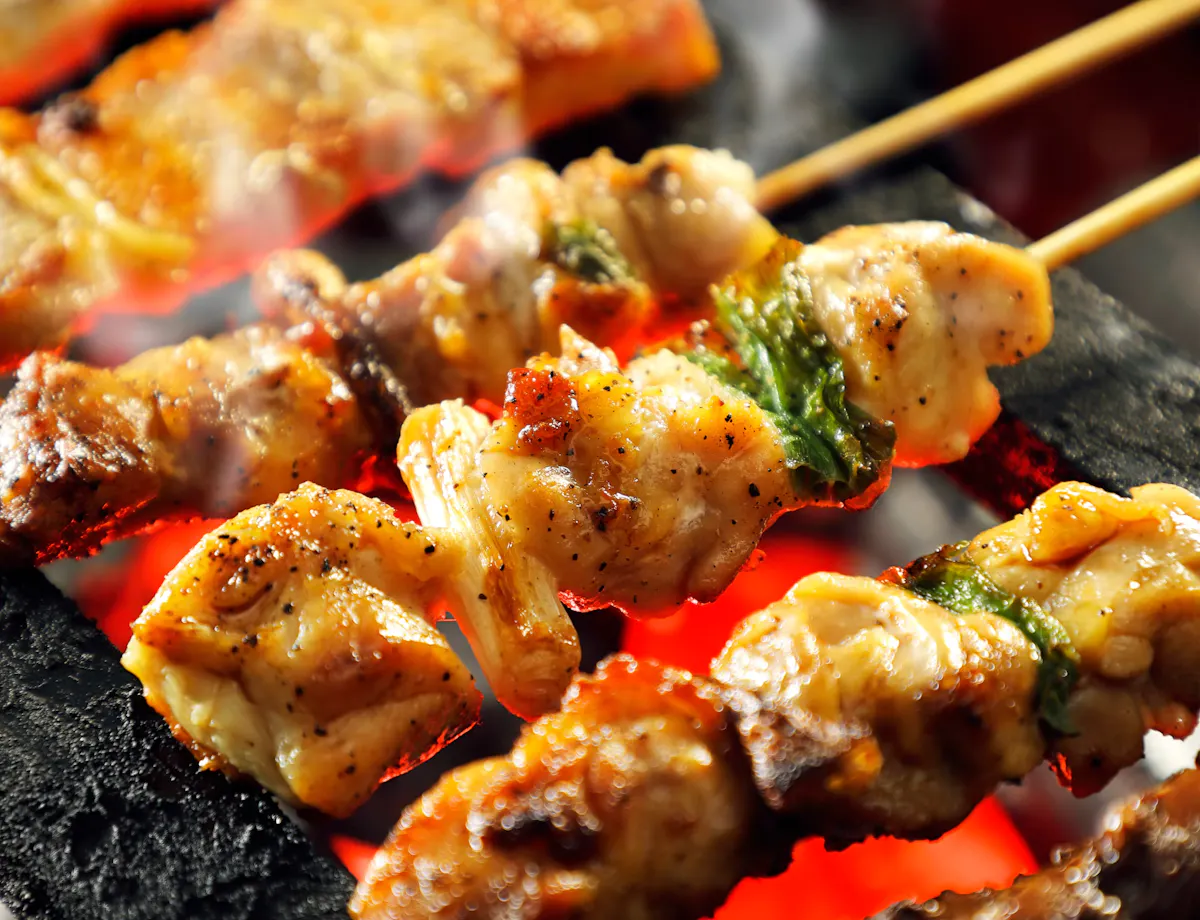
Experience Ueno’s nightlife like a local with this all-you-can-drink bar-hopping tour. Visit hidden izakayas, enjoy delicious Japanese food, and sip unlimited drinks.
Near the Ueno Station end of Ameyoko Shopping Street, Tokudaiji has been selling Japanese tea since 1902. The current owner represents the fourth generation, and he conducts tea tastings every afternoon at 3 PM. These aren't formal ceremonies; he simply brews different teas and explains their characteristics while customers sample.
The shop specializes in sencha from Shizuoka and gyokuro from Kyoto, but the owner also stocks unusual varieties like smoked tea and aged oolong. He roasts some teas in-house using a traditional charcoal method that brings out deeper flavors.
The prices range from affordable daily-drinking teas to premium selections for special occasions. What makes Tokudaiji stand out in Ameyoko Shopping Street is the owner's willingness to educate rather than just sell. He wants customers to understand what they're buying and how to brew it properly at home.
History of Ameya Yokocho Market
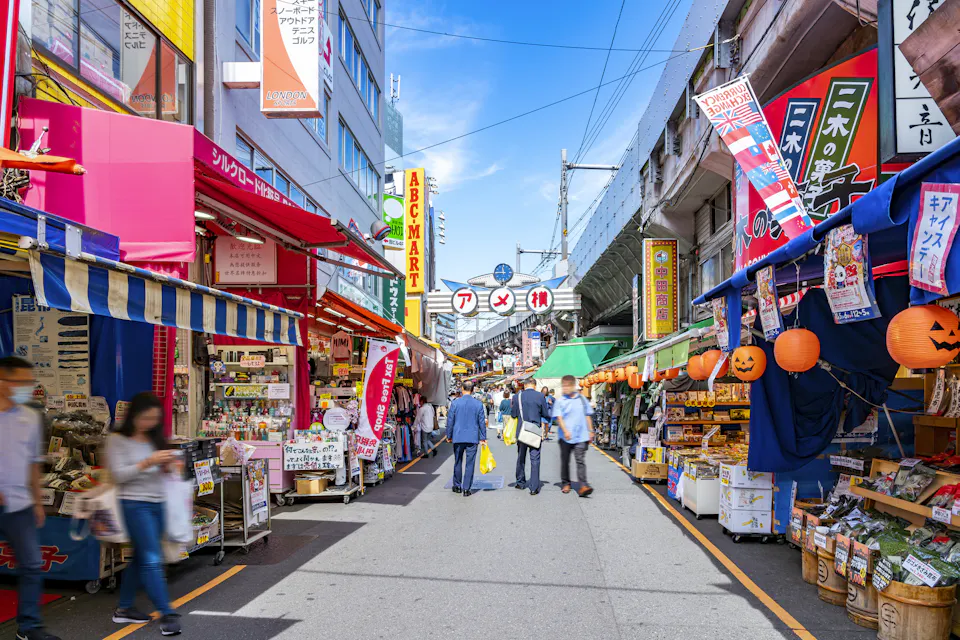
Ameya Yokocho market grew from the black markets that emerged after World War II, when vendors sold sweet potatoes and American goods to struggling Tokyo residents. The name itself comes from either "Ameya" (candy store) or "America Yokocho" (America alley), depending on who you ask. Today, Ueno Ameyoko maintains that raw, unpolished energy that makes it feel fundamentally different from Tokyo's sanitized shopping districts.
The market operates daily from around 10 AM to 8 PM, though individual shops set their own hours. Wednesday sees fewer crowds if you want breathing room, while weekends and the days before New Year transform Ameyoko street into shoulder-to-shoulder chaos as Tokyo residents stock up on ingredients.
Getting to Ueno Ameyoko Shopping Street
The Ameyokocho shopping district is incredibly easy to reach. Take the JR Yamanote Line to Ueno Station and use the Shinobazu Exit. You'll spot the market entrance immediately. Alternatively, exit at Okachimachi Station and enter from the southern end.
The market sits perfectly positioned for exploring multiple Tokyo attractions in one day. After shopping at Ameyoko Ueno Tokyo, you can easily walk to Ueno Park, home to several museums and the famous Ueno Zoo, or explore the nearby Yanaka neighborhood with its traditional atmosphere.

